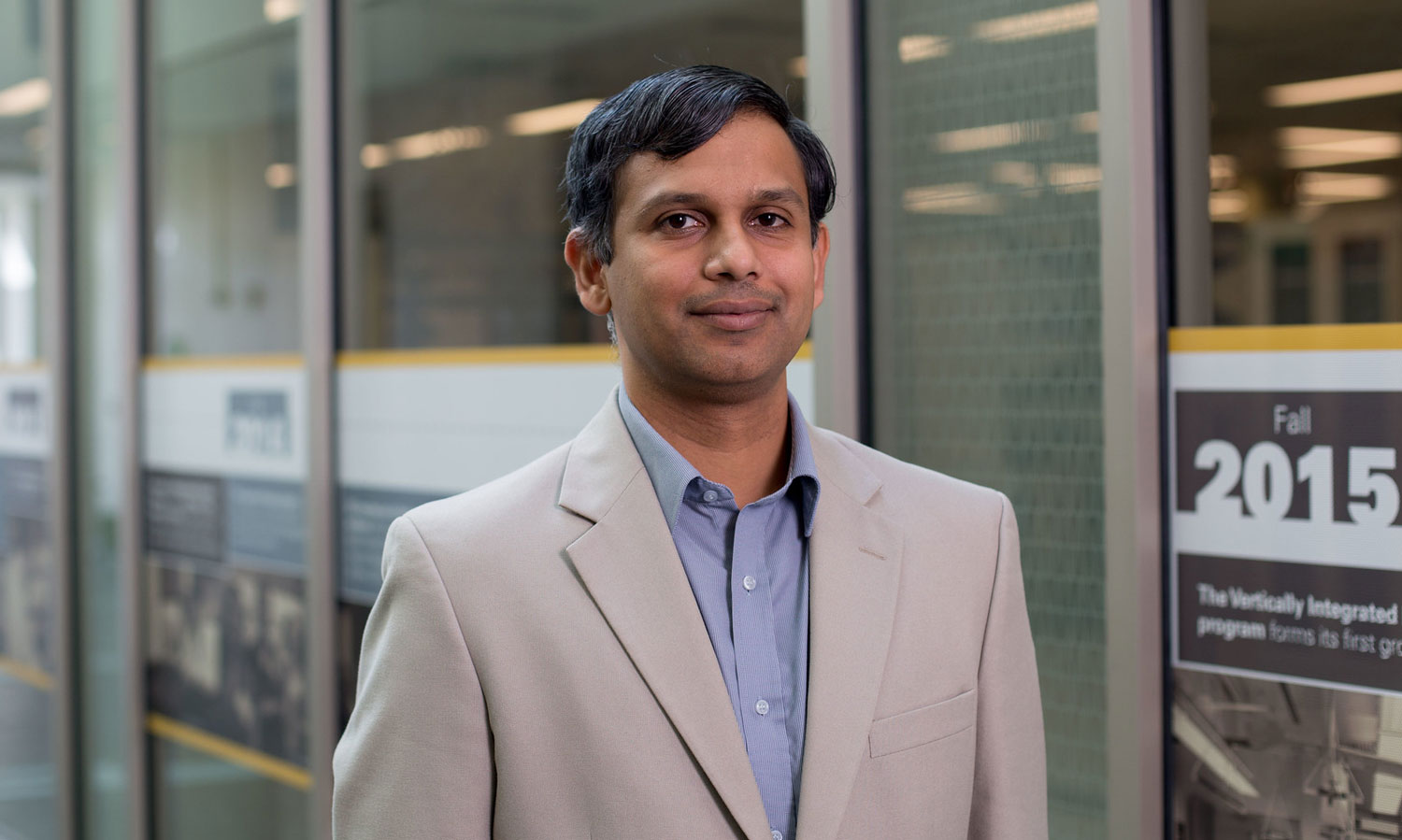Researcher awarded two NSF grants for research involving quantum computing, magnetic memory devices

Funding will bolster research on spin-based scalable quantum computers and energy-efficient magnetic memory devices.
Jayasimha Atulasimha, Ph.D., Engineering Foundation Professor with the VCU Department of Mechanical and Nuclear Engineering with an affiliate appointment in electrical and computer engineering, has been awarded two National Science Foundation (NSF) grants with additional funding from the United Kingdom’s Engineering and Physical Sciences Research Council (received by the UK collaborator).
The first award, ‘Energy Efficient Quantum Control of Robust Spin Ensemble Qubits,’ is intended to promote the expansion of Quantum Information Science activity at VCU. It will use voltage-control of nanoscale magnets for energy efficient and selective addressing of spin qubits with high spatial resolution, making it easy to integrate with existing semiconductor foundry manufacturing processes.
The project — primarily a research award with teaching, curriculum and outreach work at the graduate, undergraduate and K-12 levels — is in partnership with professor Louis Bouchard, Ph.D., associate professor in the Department of Chemistry and Biochemistry at the University of California Los Angeles (UCLA).
Atulasimha’s research on the subject has been focused on the use of nanomagnetism and spintronics for developing energy efficient, non-volatile memory and neuromorphic computing devices — energy efficient hardware for AI and Machine Learning.
“This grant enables me to expand my research focus by leveraging my group’s expertise in nanoscale magnetism towards energy efficient and scalable addressing of spin qubits for quantum computing, as well as develop a course and lab module in this new area of research,” says Atulasimha.
Atulasimha’s team has recently published a paper in Communication Physics, in collaboration with groups at UCLA, that shows how nanomagnets can produce highly localized AC magnetic fields on a proximal spin ensemble qubit to implement robust high-fidelity single qubit gate. His team aims to extend this work to two qubit gates, including hardware error corrections.
On the experimental side, Atulasimha would like to build a robust qubit platform with mesoscopic spins with Bouchard and other groups at UCLA, and also experimentally demonstrate control of spin qubits driven by magnetization dynamics in proximal nanomagnets resonant to the Larmor frequency of such spins.
He also seeks to create an introductory course in quantum computing at VCU Engineering and collaborate with faculty in computer science for a follow up course on quantum algorithms as well as expand outreach in quantum information science.
The second NSF award, ‘Acoustically induced Ferromagnetic Resonance assisted Energy Efficient Spin Torque memory devices,’ focuses on making computing more energy efficient and sustainable in semiconductor devices using non-volatile magnetic memory. The key innovation proposed is surface acoustic waves induced ferromagnetic resonance: a phenomenon by which energy applied to the nanomagnets is accumulated over tens of cycles to produce a large magnetization deflection in a few nanoseconds to significantly lower the current needed to switch the magnetic state of extremely small nanomagnets. This research could lead to dense, energy efficient, non-volatile magnetic memory.
Atulasimha’s work will be a joint collaboration with Caroline Ross, Ph.D., Ford Professor of Engineering and associate head of the Department of Materials Science and Engineering at the Massachusetts Institute of Technology (both funded by the NSF) and Robert Hicken, Ph.D., professor of condensed matter physics at the University of Exeter (funded by the Engineering and Physical Sciences Research Council).
Atulasimha is also associate director of the Institute for Sustainable Energy and Environment at VCU, which addresses climate change by creating sustainable energy systems and sustainable ecologies while also educating students and working with community partners. The research associated with Atulasimha’s second NSF grant explores how efficient, non-volatile memory (focus of this grant) — along with energy efficiency in other semiconductor device technology — are essential to making the energy cost of computation sustainable in this age of big data and artificial intelligence.
“The energy consumed for computing and storing information is enormous and likely to grow exponentially. To meet this in an environmentally sustainable way, it is imperative that we develop extremely energy efficient computing and memory technologies,” says Atulasimha.
Categories Mechanical & Nuclear Engineering, Research Grants